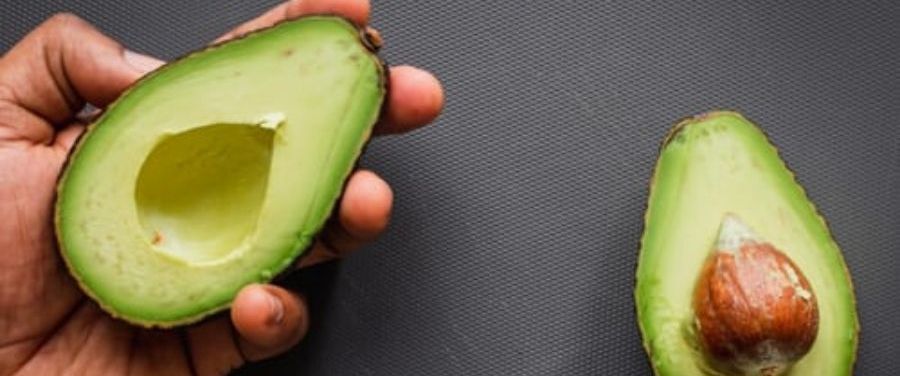Avocado is principally used as vegetable and has enough fat for a meat substitute. It’s tropics fruits like banana, which has a nutty savor that’s spoonful of an olive. It’s an indigenous to tropics and subtropical districts of Central and South America. Most of avocado’s classes is cultivated in California.
Avocado’s skin may vary from light green to dark purple like eggplant. It picked in a stage from its tree. It kept and has to be stored in an air that was open. Avocado is essentially served raw, especially in Mexican cuisines like guacamole. Although has an excessive fat content, mainly it’s of health monounsaturated assortment. Significantly possess superior potassium than the banana and its oil is well known for skin care elements, that are excellent within vitamin A, B1, B2, D and E.
AVOCADO NUTRITION:

1 Cup (about 146 grams) sliced raw avocado contains (✔️) —
- 234 calories
- 12.5 carbohydrate
- 21 g fat
- 2.9 g protein
- 17.5 mg calcium
- 42.3 mg magnesium
- 75.9 mg phosphorous
- 708 mg potassium
- 10.2 mg sodium.
WHAT ARE THE BENEFITS OF AVOCADO FRUIT?
1. Strengthens Bones:
Avocado fruit contains lutein and zeaxanthin, which help to reduce the risk of cartilage defects, that is one of the symptoms of osteoarthritis. It also contains essential minerals, such as copper, phosphorous, zinc, with trace amounts of selenium and calcium. All the minerals help to reduce the risks of osteoporosis and improvements in bone mineral density.
2. Avocado For Blood Pressure:
Avocados are especially high in calories, but can also be extremely regarded for their high levels of monounsaturated fats and potassium consequently making it likely the most useful foods for combating high blood pressure level.
Avocados seem to be helpful in regulating levels of blood sugar. Maintaining levels of blood sugar stable is very important in lowering your risk of diabetes mellitus. CDC estimates that diabetes will affect 40% of Americans at some stage during their lives. After eating half an avocado with participants had their blood sugar and insulin levels measured at particular intervals.
Although, adding avocado into the meal improved its calorie and carbs content, participants showed no increase in levels of blood sugar in contrast with individuals who ate a standard lunch free of avocado. Blood pressure level is the measure of the force of blood vessels pushing against the walls of the blood vessels. The heart pumps blood to the arteries, that is accountable for dispersing blood throughout the body.
Blood pressure level consists of two numbers — Systolic, the very first and greater of both reflects pressure in the blood vessels, when the heart beats and they’re full of blood. Diastolic, the next number, measures the pressure in the blood vessels when the heart reaches rests between beats.

A normal blood pressure reading varies from 90/60 at birth to 120/80 in a healthy adult. For seniors of 60 years age and older a reading of 150/90 is an indication of high blood pressure. It’s important to note that a reading slightly higher than 120/80 in young adults indicates a risk of developing pre-hypertension.
Having high blood pressure level makes the heart work harder and leads to hardening of the blood vessels. This in turn might lead to stroke, renal failure, and also to the development of coronary disease. Having high blood pressure degree places you at risk of coronary artery disease and stroke, which are major causes of death in America.
About 75 million American adults have high blood pressure level, that is 1 in every 3 adults. A diet low in salt and elevated in veggies, fruits and low fat dairy products might help lower blood pressure level. Highly valued for its blood pressure level combating properties inside the fruits family is the avocado, a fruits of their avocado tree native to their Western hemisphere.
Avocados are reputed to be elevated in fats, but since they’re a plant food, their fat, they contain, is therefore regarded as an oil and not a solid fat. Nevertheless, it is important to keep in mind that the majority of fat in the fruit is oleic acid, a monounsaturated fatty acid. There’s conclusive scientific evidence which points of the fact that diets rich in monounsaturated fats, are great because of enhancing your cholesterol and reducing inflammation thus reducing the risks of heart disease and strokes.
In fact, the American Heart Association recommends their consumption of monounsaturated fatty acids (MUFAs) to improve your blood lipid profile. Along with polyunsaturated fats, avocados are incredibly rich in potassium.
3. Great Source of Potassium:
Avocados are rich in potassium. These significant levels of potassium make this fruit a powerful one in the fight against hypertension.
Potassium also helps to maintain a normal heart rate. According to a research published in the Journal of Clinical Investigation, potassium-rich foods can decrease the pathogenic vascular calcification.
4. Advantages in Pregnancy:

Avocados are a natural source of folic acid, which is essential for the development of a healthful fetus.
The artificial variations of folic acid are recommended for all girls, who’re planning to become pregnant, eating avocados is an easier and tastier alternative!!
5. Promotes Healthy Heart:
Avocados are rich in beta-sitosterol, which helps to maintain healthy cholesterol levels. A research held on rats reported that the rats who ate avocados for 5 weeks had about 27% lower triglyceride plasma levels.

Also, their HDL or good cholesterol was 17% higher than others, who didn’t consume avocados as a part of their daily meal. In this way, eating avocados daily can help to protect your heart from atherosclerosis.
6. Avocados are Brimming With Good Fats:
You can have heard that you should steer clear of avocados because of their high fat content. They help heart health, that is good and help to lower blood pressure level. The fats can help reverse insulin resistance which could cause the evolution of type-2 diabetes.
7. Fantastic Source of Vitamin-E:
Avocados are the fruits with the highest amount of vitamin E. Vitamin E is a vital vitamin that can help to maintain overall health. E vitamin also has positive effects on heart problems, stroke, cancer prevention and evolution of cataracts and is widely claimed into have anti-aging properties.
8. Source of Dietary Fiber:
Avocados contain both soluble and insoluble fiber, meaning that they help to reduce levels of cholesterol by preventing nitric-oxide, help to keep bowel function and may help the body to avoid blood glucose spikes after meals.
You know precisely what you are getting whenever you purchase an avocado. Avocados have such a thick skin, which the interior fruits is protected from pesticides making the cost of organic avocados something you may easily bypass.
9. Avocados Are A Brain Food:
It contains mono-unsaturated fat, which contributes to healthy blood flow. Healthy blood flow means a healthy brain. You can add this to your diet for sure.

Dr. Daniel G. Amen considers them among the best brain healthful foods that you could consume to help reduce the potential risk of developing Alzheimer. Omega-3 fatty acid, as well as E vitamin, are naturally occurring in avocados and have been clinically proven into stop Alzheimer’s disease to progress and possibly even reversing the quite early stages.
10. Improves Vision:
Avocado contains nutrients, lutein and zeaxanthin, fighting macular degeneration, one of all the main cause of blindness in the United States. The only way to get lutein and zeaxanthin in our bodies is thru diet, which is the reason we will need to eat more foods rich in these phytonutrients.

One study has shown that avocados are the best source of lutein among all the top 20 most fruits on a regular basis consumed. They’re also a great source of zeaxanthin so consume up for much better eye health!!
11. Avocado For Weight Loss:
Including avocado in your diet may help you feel fuller for longer and reduce the desire for obese adults to eat more, according to new study just released on the usage of avocados. Surprisingly, eating avocados might actually help you lose weight. A study, published in the Nutrition Journal, found that ingestion only half an avocado helped fat people feel fulfilled and complete for longer after eating.
Participants reported a 40% less want to eat more than a three hour period, and also a 28% less want over a five hour interval after the meal. They were more fulfilled after eating their meal and had less want to snack.

Researchers at Loma Linda University researched whether adding fresh avocado into a midday meal had any impact on insulin reaction, levels of blood sugar, feelings of fullness and food intake for the remainder of the day. Their first findings ascertained that there was indeed a foundation for more study into the benefits of adding avocado into a meal.
The Hass Avocado Board is currently effectively encouraging many clinical studies to discover whether there is a connection between elevated consumption of avocados and favorable results on diabetes mellitus, weight management and risk factors of coronary artery disease.
OTHER BENEFITS:
Various individuals don’t know that avocado to be a precious fruit for their health. Avocado is packed with a lot of nutrition, mutually tenders several minerals and vitamins and helps the body to take up extra nutrients out of other foods. Avocado contains vitamins A, C, and B vitamins which maintain accurate performance of neurotransmitter, that makes it as a superior food for the nerve system.

Calcium and magnesium content of avocado can calm and promote restful sleep, which is vital for nerve system to perform efficiently at maximum. Health benefits correlated to the nerve system, avocado as well support in a variety of ways. Potassium, folic acid and monounsaturated fatty acid compounds reduces low-density lipoprotein rates and thus reduces the danger of myocardial infarction.
It as well contain a polite quantity of E vitamin and glutathione that aid in averting some forms of heart ailments and slows down aging activity. Seven different fatty acids in avocado that include Omega 3 and 6. Both provide required body energy while reducing low-density lipoprotein level.
Though all the fat content of avocados is high, they contain good fats such as monounsaturated fat. This type of fat can reduce the threat of stroke or myocardial infarction with the degrees of low-density lipoprotein in blood.
Chronic inflammation inside the body is believed to be responsible for asthma allergies, arthritis, Alzheimers, heart issues, cancer and most of today’s contemporary diseases. Avocado might help to combat inflammation, as a result of its oleic acid content, all the monounsaturated fat in olive oil accountable for a lot of its healthful properties. Oleic acid has been linked with reduced inflammation in many studies.
WHAT ARE THE HEALTH BENEFITS OF AVOCADO LEAVES?
Avocado leaves are employed as a curative for tumors and arthritis. Take avocado’s leaves and make ready as tea. Called a miraculous since its curative impact could not be exemplified by a few doctors. In Latin America, leaves are beneficial in medical and culinary applications.

Its leaves has an important oil properties that accounts for its culinary uses. The foliage is applied for respiratory ailments, that includes juice, cough, and normalize menstruation. Fruit and foliage extracts substantially motivates rat womb in vitro and also the combination of spasmic effects on small intestines. It also bears an anti-tumor flavanoids, called flavan -3-4 diol. These flavanoids appeared to lessen tumors.
WHAT ARE THE SIDE EFFECTS OF AVOCADO?
Now, let’s discuss why is avocado bad for you! Excess intake of this fruit may also cause some side-effects, including —
- Nausea
- Vomiting
- Migraine
- Sensitivity to light
While experiencing these symptoms, just take precautions and avoid the consumption of avocado fruit.
FINAL WORDS
Avocados are an excellent food, loaded with nutrients, minerals, vitamins and healthy fat, many of which are lacking in the modern diet. Just go for it!!
RELATED ARTICLES:
